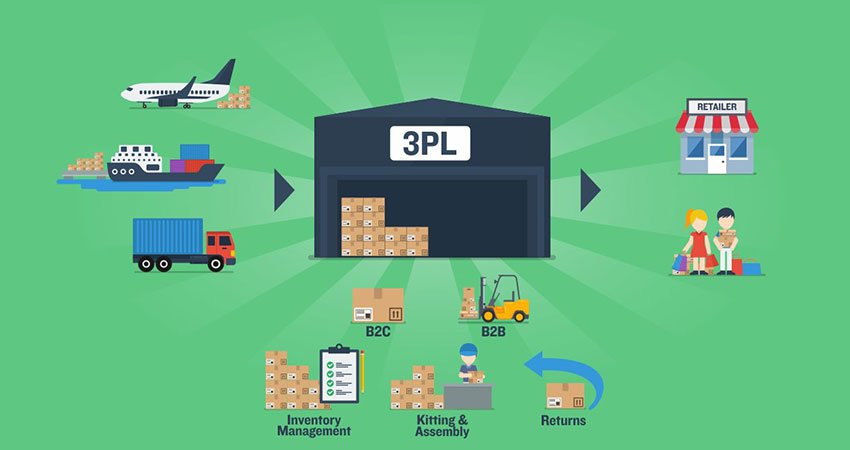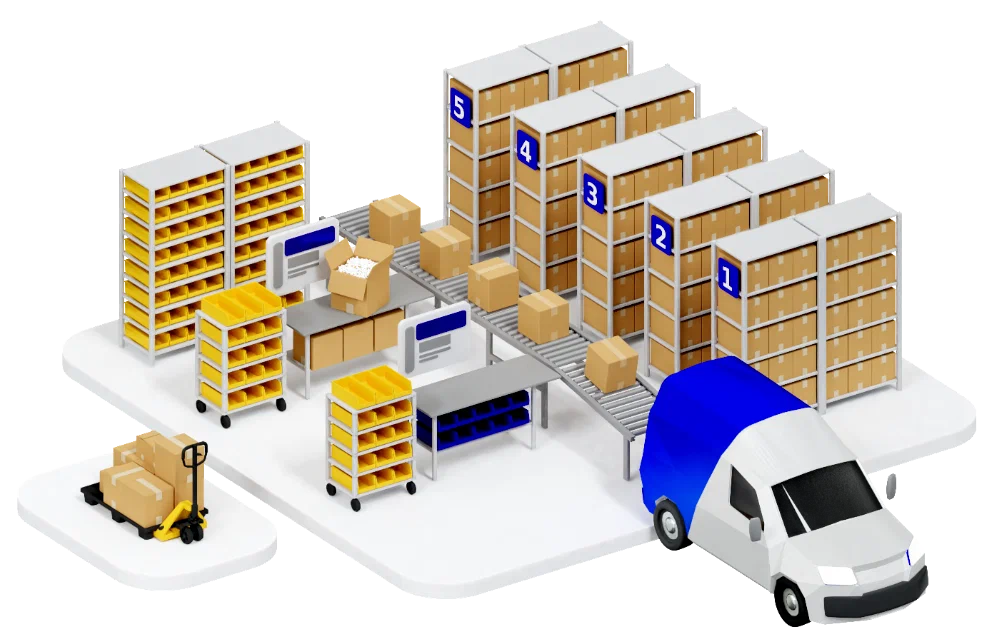According to recent studies, 70% of customers cite delivery speed as a crucial factor in their purchasing decisions, while 23% of eCommerce orders are returned due to fulfillment errors. As online shopping continues to surge projected to reach $6.4 trillion by 2024 businesses face unprecedented pressure to meet consumer expectations.

This is where an eCommerce Warehouse Management System (WMS) becomes essential. By optimizing inventory management, improving order fulfillment, and enhancing overall operational efficiency, a WMS can be the difference between thriving and merely surviving in today’s competitive marketplace. In this guide, we’ll explore what a WMS is, its key features, benefits, and tips for selecting the right system for your business.
What is an ECommerce Warehouse Management System (WMS)?
It is a specialized software solution designed to streamline and optimize the various processes involved in warehouse operations specifically for online retail businesses. It enables eCommerce companies to manage their inventory effectively, track orders in real-time, and enhance overall operational efficiency.

At its core, a WMS helps automate critical functions such as inventory tracking, order fulfillment, and shipping management. For instance, when a customer places an order online, the WMS immediately updates inventory levels, generates picking lists for warehouse staff, and coordinates shipping logistics. This real-time management ensures that products are available when customers need them, reducing the risk of stockouts or delays.
Additionally, an effective eCommerce warehouse management system offers integration capabilities with various eCommerce platforms, payment processors, and shipping carriers, creating a cohesive ecosystem. This integration is crucial in today’s multi-channel retail environment, where businesses sell through their websites, social media, and online marketplaces.
By implementing an eCommerce WMS, businesses can improve accuracy in order processing, increase the speed of fulfillment, and ultimately enhance customer satisfaction. In a competitive landscape where timely delivery and precise inventory management are paramount, a WMS becomes a vital tool for achieving success in the eCommerce arena.
Components of a Good Ecommerce Warehouse Management System
A robust Warehouse Management System (WMS) encompasses several essential features that enhance operational efficiency:
- Warehouse Design Systems: These tools enable you to establish the most efficient workflows tailored to your warehouse layout.
- Integration with Inventory Technologies: A good WMS supports integration with devices like radio-frequency identification (RFID) and barcoding systems, improving accuracy and speed in inventory management.
- Back-Office Integration: Seamless connections with order entry, inventory control, and purchase order modules ensure streamlined operations.
- Real-Time Inventory Tracking: Stay updated on stock movements with real-time tracking, which helps prevent stockouts and overstocking.
- Workforce Management: This feature allows you to allocate labor effectively and monitor employee performance, optimizing workforce productivity.
- Support for Multiple Picking and Packing Methods: Get an overview of picking zones and various methods to enhance order fulfillment efficiency.
- Compliance Labeling and Advanced Shipping Notices (ASNs): Manage new inventory arrivals and ensure compliance with regulations through effective labeling and notification systems.
- Yard and Dock Management: Assist delivery partners in finding the right loading and unloading areas to streamline the receiving process.
In terms of usability, a good ecommerce warehouse management system may also include:
- Integration with Enterprise Resource Planning (ERP): For medium to large enterprises, the ability to scale and integrate with ERP systems is crucial for cohesive operations.
- Advanced Reporting Capabilities: Generate detailed analytics that provide insights into warehouse performance, which can be shared across the business for informed decision-making.
- Mobile-Friendly Design: A user-friendly interface accessible via mobile devices allows for flexibility and productivity, freeing users from their desks.
WMS solutions can vary in complexity, with options available to meet the specific needs of your business.
Benefits of Ecommerce Warehouse Management System
-
Improved Inventory Accuracy
Managing inventory effectively is one of the most challenging aspects of running a retail operation. Too much stock can lead to items passing their sell-by dates, while too little stock means those frustrating “product unavailable” messages that drive potential customers away.
One major issue that retailers face is inventory shrinkage, which occurs when the actual stock on hand is less than what your records indicate. This shrinkage costs businesses around $94.5 billion annually. That’s a staggering amount!
This is where an ecommerce warehouse management system (WMS) comes in. It provides real-time insights into inventory levels, allowing you to scan barcodes for new inventory and track the retrieval of each unit picked for orders. This level of monitoring helps prevent inventory shrinkage and ensures greater accuracy.
A good WMS also offers advanced order analytics, empowering you to:
-
- Understand which states you ship to most frequently
- Monitor undelivered orders
- Check current inventory levels at a glance
- Review historical stock data whenever needed
- Calculate how many days are left until a specific SKU runs out of stock
- Manage order replenishment based on real-time stock availability
- Allocate orders efficiently to international warehouses or distributors
- Analyze average cart values and shipping costs
- Identify areas where you can save on shipping expenses
-
Streamlined Logistics
Thanks to eCommerce giants like Amazon, customer expectations for shipping speed have skyrocketed. Nowadays, 97% of consumers consider same-day shipping fast, while 95% view next-day shipping as standard. To keep customers happy, your items need to arrive at their doorsteps within 24 hours.
A WMS helps you meet these expectations by providing accurate shipping estimates based on precise logistics data. This way, customers receive reliable delivery timelines, reducing the chances of awkward notifications about shipping delays.
Plus, many WMS providers have established partnerships with third-party logistics companies, allowing you to leverage their high order volumes for fast, free delivery across various locations.
-
Improved Order Efficiency
Integrating an eCommerce Warehouse Management System (WMS) with your e-commerce platform means your stock levels are always up to date. This eliminates the worry of customers placing orders for out-of-stock items. Fewer inventory errors translate to faster fulfillment times and greater accuracy.
Improving order efficiency can also significantly lower your inventory costs by as much as 10% by reducing both stockouts and overstocks. Other ways a WMS enhances order efficiency and accuracy include:
-
- Assigning optimized routes for pickers
- Opening additional fulfillment centers to cut down on shipping times
- Streamlining packing processes for quicker dispatch.
-
Lower Labor Costs
The productivity gains that come from using a WMS often outweigh its initial costs. By automating processes, a WMS reduces labor expenses related to recounting inventory or repackaging products, freeing up your staff to focus on more strategic tasks.
Moreover, when order counts are accurate and shipping processes are efficient, your entire warehouse operates more smoothly. This efficiency minimizes the risk of returns, which can eat into your profits. Higher order accuracy not only leads to improved customer satisfaction but also makes an Ecommerce Warehouse Management System a more cost-effective solution than traditional labor-management methods.
In Conclusion …
A robust Warehouse Management System (WMS) is not just a luxury, it’s a necessity. With benefits ranging from improved inventory accuracy to streamlined logistics and lower labor costs, investing in a WMS can significantly enhance your operational efficiency and customer satisfaction.

Are you ready to elevate your ecommerce warehouse management? At “3rd partner”, we specialize in providing tailored WMS solutions designed to meet your unique needs. Contact us today to learn more about how our services can transform your warehouse into a high-performing hub of efficiency.
Your Partner in Quality and Compliance
Are you seeking a reliable logistics partner that prioritizes the integrity of your delicate products? Look no further than 3rd partner. Our specialized services are designed to meet the stringent requirements of the Food and Drug Authority, ensuring that your goods are handled with the utmost care. From receiving and storage to processing, packaging, and shipping, we offer a seamless end-to-end solution. Experience the difference with our commitment to quality, compliance, and customer satisfaction.
- Storage Service
- Licensed Warehouse Service
- Inventory and Order Management Service
- Transportation and Distribution Service
- NUPCO Supplies Service
- Linking Service with the ‘RSD’ Platform
- Storage Service for E-commerce Stores
- Inventory and Order Management Service
- Shipping and Cash on Delivery Service
- Returns and Compensation Management Service











